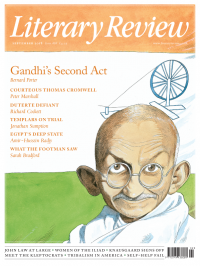Pamela Norris
Double Life After Double Life
Transcription
By Kate Atkinson
Doubleday 336pp £20
In Transcription, Kate Atkinson recasts the bildungsroman within the fertile genre of the spy thriller. The novel’s heroine is Juliet Armstrong, who in 1940, aged eighteen and newly orphaned, is recruited by MI5 to assist in an undercover operation to monitor the activities of fifth columnists. Discreetly cocooned in a Pimlico flat, Juliet transcribes the conversations recorded in the neighbouring flat between a group of Nazi sympathisers and Godfrey Toby, an MI5 official whom the informants (known as ‘our neighbours’) believe to be a Gestapo agent. Intelligent and able, Juliet is soon inducted into a more active role. Posing as Iris Carter-Jenkins, a War Office clerk, she is charged with infiltrating the Right Club, a group of anti-Semitic Establishment figures, and getting hold of the Red Book that lists their names. ‘Think of it as an adventure,’ her handler, Perry, says, and that is how it seems to Juliet, a ‘Girl’s Own adventure’, ‘a bit of a lark’. Then a young woman is murdered, and Juliet herself helps to commit a ‘hideous act’, which is swiftly expunged from the record. Ten years later, working as a producer at the BBC, ‘the other great national monolith’, Juliet is stalked and anonymously threatened. ‘There is no action without consequence’ was one of Perry’s maxims. Is Juliet now to face a reckoning?
Kate Atkinson has always enjoyed playing with genre. She began by writing quirky family sagas, of which the first, Behind the Scenes at the Museum, won the Whitbread (now Costa) Book of the Year prize in 1995. Four bestselling crime novels followed, which placed former detective Jackson Brodie in a series of daringly preposterous scenarios. Then, in another creative volte-face, Atkinson wrote the experimental Life After Life (2013), which won the Costa Novel Award, as did its companion, A God in Ruins (2015). Among her favourite themes are the experiences of orphan girls (Reggie in When Will There be Good News? is a typically resourceful example), the randomness of events (Life After Life posits alternative ‘what-if’ life and death scenarios for its heroine), the effects of sudden and horrific violence and the impact of the past on present events. All of these recur in Transcription.
The action in Transcription begins slowly and gathers momentum. The narrative tracks back and forth in time between 1981, when Juliet is hit by a car, her wartime experiences with MI5, and her work with the BBC in 1950. Events are observed through Juliet’s partly knowing eyes, from her early

Sign Up to our newsletter
Receive free articles, highlights from the archive, news, details of prizes, and much more.@Lit_Review
Follow Literary Review on Twitter
Twitter Feed
Under its longest-serving editor, Graydon Carter, Vanity Fair was that rare thing – a New York society magazine that published serious journalism.
@PeterPeteryork looks at what Carter got right.
Peter York - Deluxe Editions
Peter York: Deluxe Editions - When the Going Was Good: An Editor’s Adventures During the Last Golden Age of Magazines by Graydon Carter
literaryreview.co.uk
Henry James returned to America in 1904 with three objectives: to see his brother William, to deliver a series of lectures on Balzac, and to gather material for a pair of books about modern America.
Peter Rose follows James out west.
Peter Rose - The Restless Analyst
Peter Rose: The Restless Analyst - Henry James Comes Home: Rediscovering America in the Gilded Age by Peter Brooks...
literaryreview.co.uk
Vladimir Putin served his apprenticeship in the KGB toward the end of the Cold War, a period during which Western societies were infiltrated by so-called 'illegals'.
Piers Brendon examines how the culture of Soviet spycraft shaped his thinking.
Piers Brendon - Tinker, Tailor, Sleeper, Troll
Piers Brendon: Tinker, Tailor, Sleeper, Troll - The Illegals: Russia’s Most Audacious Spies and the Plot to Infiltrate the West by Shaun Walker
literaryreview.co.uk